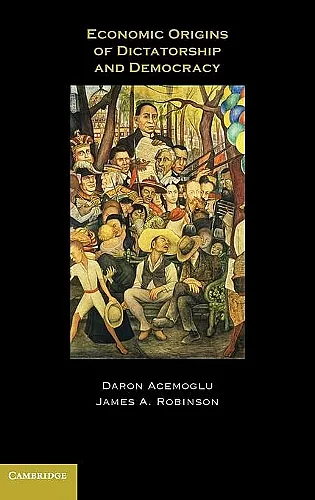Economic Origins of Dictatorship and Democracy
Daron Acemoglu author James A Robinson author
Format:Hardback
Publisher:Cambridge University Press
Published:19th Dec '05
Currently unavailable, and unfortunately no date known when it will be back
This hardback is available in another edition too:
- Paperback£26.99(9780521671422)

This book systematically explains why some countries are democracies while others are not.
This book is the first to use modern social science methodology systematically to explain why some countries are democracies while others are not. Why does democracy sometimes persist and consolidate while other times it collapses? The treatment shows that whether or not a society becomes democratic depends on several factors.This book develops a framework for analyzing the creation and consolidation of democracy. Different social groups prefer different political institutions because of the way they allocate political power and resources. Thus democracy is preferred by the majority of citizens, but opposed by elites. Dictatorship nevertheless is not stable when citizens can threaten social disorder and revolution. In response, when the costs of repression are sufficiently high and promises of concessions are not credible, elites may be forced to create democracy. By democratizing, elites credibly transfer political power to the citizens, ensuring social stability. Democracy consolidates when elites do not have strong incentive to overthrow it. These processes depend on (1) the strength of civil society, (2) the structure of political institutions, (3) the nature of political and economic crises, (4) the level of economic inequality, (5) the structure of the economy, and (6) the form and extent of globalization.
'This path-breaking book is among the most ambitious, innovative, sweeping, and rigorous scholarly efforts in comparative political economy and political development. It offers a broad, substantial new account of the creation and consolidation of democracy. Why is the franchise extended? How do elites make reform believable and avoid expropriation? Why do revolutions nevertheless occur? Why do new democracies sometimes collapse into coups and repression? When is repression abandoned? Backed by a unified analytic model, historical insight, and extensive statistical analysis, the authors' case is compelling.' James E. Alt, Frank G. Thomson Professor of Government, Harvard University
'This tour de force combines brilliant theoretical imagination and historical breadth to shine new light on issues that have long been central in social science. The book cannot be ignored by anybody wanting to link political and economic development. Its range is truly impressive. The same logical framework offers plausible predictions about revolution, repression, democratization, and coups. The book refreshingly includes as much Latin American experience as European experience, and as much Asian as North American. The authors offer new intellectual life to economics, political science, sociology, and history. Game theory gains a wider audience by being repeatedly applied to major historical issues for which commitment is indeed a key mechanism. Economists and political scientists gain more common ground on their political economy frontier.' Peter Lindert, University of California, Davis
'Acemoglu and Robinson have developed a coherent and flexible analytical framework that brings together many aspects of the comparative political economy of democratization and democratic consolidation. Beyond being an excellent work of synthesis, this framework also leads to insights that will pave the way for further theoretical and empirical investigation. The combination of theory and historical application make this a first-rate book for teaching, as well as a major research contribution.' Thomas Romer, Princeton University
'This book is an immense achievement. Acemoglu and Robinson at once extend the frontiers of both economics and political science; they provide a new way of understanding why some countries are rich and some are poor; and they reinterpret the last 500 years of history.' Barry Weingast, Stanford University
'A vast body of research in social science on the development of democracy offers detailed accounts of specific country events but few general lessons. Acemoglu and Robinson breathe new life into this field. Relying on a sequence of formal but parsimonious game-theoretic models and on penetrating historical analysis, they provide a common understanding of the diverse country histories observed during the last two centuries,' Torsten Persson, Director, Institute for International Economics Studies, Stockholm University
'I expect Economic Origins of Dictatorship and Democracy to be highly influential. … Acemoglu and Robinson will deservedly win an audience. Students of economics will study this text as much for its methodical exposition and academic proofs as for its conclusions. They will find the effort well worthwhile.' Financial Times
'Acemoglu and Robinson have dared to set themselves up as targets. It is unlikely that the naysayers and nitpickers will be able to desist. Nor should they. And if the authors' effort survives the pounding as well it might it will be a triumph not just for Acemoglu and Robinson but for economics and its methods.' Arvind Subramanian, International Monetary Fund Journal
'I would recommend this book to anyone with a serious interest in democratic transitions and economic development. Its historical scope, and the power of the models it develops, set a new standard in political economy.' Michael Munger, EH.NET
'In this superb volume, Daron Acemoglu and James A. Robinson, seek to answer age old questions in political economy … Their answers, and the manner in which they were obtained, are refreshingly new.' Roman Wacziarg, Science
'The book is an ambitious attempt to offer tentative answers to some age-old questions in political economy and political science. … the book is well-written and structured as well as innovative and newsworthy, allowing Acemoglu & Robinson to win a general audience from political science. … the book can be useful for graduate studnets from economics with a focus on political economy.' CEU Political Science Journal
- Winner of Association of American Publishers/Professional and Scholarly Publishing Division Award 2006
- Winner of Woodrow Wilson Foundation Award 2007
- Winner of.
- Joint winner of Woodrow Wilson Prize, American Political Science Association 2007
ISBN: 9780521855266
Dimensions: 243mm x 161mm x 28mm
Weight: 739g
434 pages